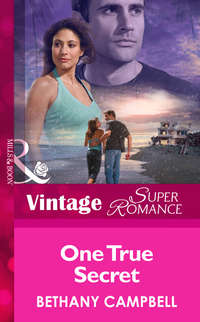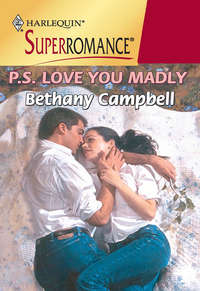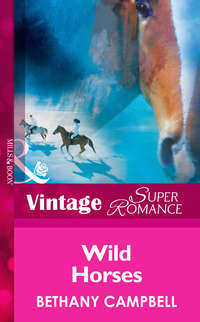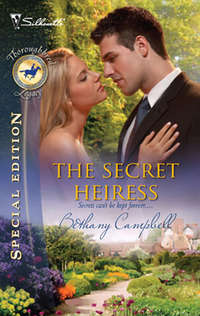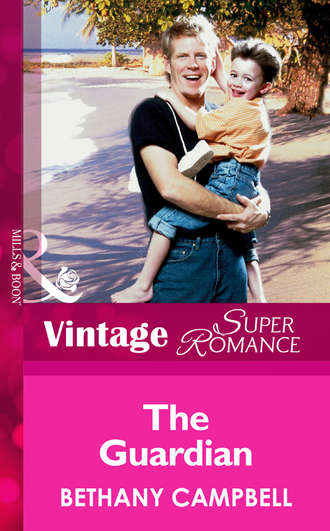
Полная версия
The Guardian
And Charlie, dutiful as a page in training to a great knight, obeyed.
IN THE YARD, next to a cluster of flowering shrubs, Maybelline squatted modestly. Kate stared off in the opposite direction, trying to seem too dignified to notice.
She saw Hawkshaw come out on the deck. He tilted back the bill of his cap and stared down at her.
Self-conscious, Kate tried to ignore him. She was a mess, of course. She was pale with a Northerner’s pallor, and she hadn’t fastened her hair back, done anything to it except brush it.
Her jeans were baggy, her shirt mannish, and Hawkshaw probably wondered why anyone, least of all a stalker, would want her.
His gaze seemed to settle on the slight thrust of her breasts under the shirt, and, in embarrassment, she looked away. She was imagining things, she told herself. And if she wasn’t, the last thing she needed was anybody’s sexual interest. She’d had enough for a lifetime.
Her son was chattering a mile a minute to the man, and Hawkshaw answered with grunts and nods. But when she stole a glimpse at him, she saw his eyes were still on her.
Maybelline plodded a few steps into the shade and sat down among the deep-red phlox. Delicately, she began to gnaw at her haunch, as if besieging a flea.
Kate knelt beside her, slipping her arm around the dog affectionately. She nuzzled one of the velvety ears. Maybelline kept pursuing the flea.
Kate raised her eyes and stared toward the patch of sea that showed between the trees. The sun beat on her face, and she thought of Charlie, who was as fair-skinned as she. The both of them would need hats and sunscreen, or they’d be burned and blistered.
She turned to look at Charlie again and saw Hawkshaw take off his own cap and adjust it to make it tighter. “Here, kid,” he said, setting it on Charlie’s head. “You want to wear this?”
“Wow,” Charlie breathed, reverently fingering the bill. “You’ll let me?”
“Sure,” said Hawkshaw.
The boy smiled more widely than Kate had seen him smile in weeks. She swallowed.
He was a nice-looking boy, she thought, handsome, even. He had his father’s straight brown hair and angular, masculine features. But his eyes were the same color brown as hers, and in them shone a lively intelligence, a bright imagination.
But sometimes, because of his attention deficit, Charlie’s liveliness was too unfettered; it needed taming.
It seemed profoundly unfair to her that the boy had faced so many problems. The loss of his father, the insanity of her being stalked, his own disability—some—times her feelings of protectiveness for him almost overwhelmed her.
Hawkshaw turned his attention back to Kate. She dropped her gaze to the dog and started to unfasten the leash.
“Wait,” Hawkshaw ordered. “I wouldn’t do that if I were you.”
She looked up, surprise mingled with resentment. His tone had been abrupt, even imperious.
“What’s wrong?” she demanded.
He made his way down the narrow stairs, Charlie tagging behind him like a puppy.
“I just wouldn’t let her off yet,” Hawkshaw said. “The Keys aren’t like the city. Nature gets a little snarky down here.”
“Snarky?” she asked dubiously. It seemed an unlikely word for him to use.
“Dangerous,” he amended. “Come on. Let’s walk her around the yard. I’ll explain what I mean.”
“Look at me, Mama,” Charlie said, fairly dancing before her, adjusting the oversize cap on his head. “I’m a Secret Service man—I guard people.”
He dived on the unsuspecting Maybelline and caught her in a possessive embrace. “You’re a spy!” he informed the startled dog. “I got you!”
Maybelline sighed, martyrlike, and let him wrestle her to the ground. Kate stared down at the boy in shock. “Charlie! Where’s your shirt?”
He had been wearing a shirt only a moment before, she was certain of it. Now his thin, white back was as bare as Hawkshaw’s tanned one.
“Charlie, Charlie,” Kate said, pulling him off the dog. “I asked you—where’s your shirt?”
“I don’t remember,” he said carelessly. He picked up a stick and aimed it into the trees like a gun. “Bang!” he yelled. “Stick ’em up—you’re under arrest!”
Kate knelt before him and pushed the stick down firmly. “Why?” she said, very clearly, very carefully. “Why did you take off your shirt?”
“I don’t have a shirt because I don’t need one,” Charlie said, echoing Hawkshaw exactly. “This is the Florida Keys. It’s warm all year.”
She looked back toward the deck and saw the boy’s polo shirt lying inside out on the bottom stair. He had stripped it off and tossed it aside.
“Charlie,” Kate said firmly, “you have to wear a shirt. You’ll get a sunburn—a bad one.”
“I don’t need one,” the boy repeated stubbornly. “This is Florida.” He adjusted the cap again and looked up at Hawkshaw with shining eyes. “I like Florida better than I did,” he said.
Hawkshaw put his hands on his hips. “Charlie, your mother’s right. Put your shirt back on. Go on. Do it.”
Charlie stood, his face indecisive for a moment. Then he brightened and said, “Okay.” He dashed away and ran back to the stairs. He struggled with his shirt and at last got it on, but inside out.
Kate dropped the dog’s leash, rose to her feet and gave Hawkshaw a sarcastic look. She strode to where Charlie twisted and wriggled. She pulled the shirt off and then expertly put it on him again, right side out.
He jammed the hat back on his head and ran over to Hawkshaw. “I got my shirt on, see?” he said eagerly.
Hawkshaw nodded, keeping his face impassive. “That’s good,” he said. “A boy should mind his mother.”
Kate picked up Maybelline’s leash. She made her voice controlled, almost frosty. “You were going to give us the safety tour, Mr. Hawkshaw?”
“Yes,” Hawkshaw said. “Now the Keys are a special environment. This island we’re on—”
“We’re on an island?” Charlie interrupted, tugging at Hawkshaw’s bare knee. “An island? Where’s the ocean?”
Hawkshaw pointed between the trees. “Over there,” he said.
“I can’t see it,” Charlie almost wailed in disappointment. “Where?”
Hawkshaw hoisted him up easily, so the boy’s head was as high as his own. “Over there. See it?”
“Oh,” Charlie said with disappointment. “I thought it’d be bigger.”
Hawkshaw laughed. “It is bigger. You can’t see much of it from here, that’s all.”
“Can we go closer?” Charlie begged.
“Sure,” Hawkshaw said. “Why not? You better ride on my shoulders. There’s poisonwood between here and there. You’ll have to learn how to identify it, stay away from it.”
“Poisonwood?” Charlie asked, charmed at the exotic and dangerous sound of it.
“Yeah. I’ll show you.” Hawkshaw let the boy settle on his shoulders. He turned to Kate, who stood, holding the dog’s leash and eyeing him warily. “You should come, too,” he said. “You need to learn these things.”
“Then by all means,” she said with a shrug, “let the lesson begin.”
For the first time, he smiled at her, the barest curve at one corner of his lip. He seemed to be saying, You have a problem with this, lady? He moved off through the trees, Charlie on his shoulders.
She felt a strange, primal emotion surge deep within her, a feeling so foreign that at first she didn’t recognize it. And when she recognized it, she was ashamed.
Even when her husband had been alive, Charlie was very much her child. Since Chuck’s death, it had seemed like her and Charlie, the two of them, together against the world. She was used to being the most important person in the boy’s life.
Now, in a matter of moments, he had fallen under the spell of Hawkshaw—Hawkshaw, of all people. And Kate, suddenly relegated to second place in the boy’s regard, was shocked to feel the sting of jealousy.
CHAPTER FOUR
IN HAWKSHAW’S BOYHOOD, Cobia Key had been wild and solitary, and it had suited him; he had been wild and solitary himself.
Now he felt the slight weight of the boy on his shoulders and remembered being carried by his own father the same way in this same place. He remembered how his father had introduced him to this mysterious land that could be at once both beautiful and fearful.
The famous Keys highway had run through Cobia to end in Key West, its tipsy and not quite respectable final destination. But in those days hardly anyone stopped in Cobia, for it seemed there was nothing to stop for.
But the island had its inhabitants. They were few but hardy, independent souls who relished Cobia’s privacy and its isolation for their own reasons, sometimes legal, sometimes not.
Over the years, while Hawkshaw had been gone, the edges of Cobia’s splendid loneliness had been eaten away. The highway through it now sported an ugly restaurant, an uglier motel, and a small but hideous strip mall.
A new housing subdivision had grown up along the open water, concrete dwellings colored in pastels like different flavors of ice cream. They looked as if they were made for mannequins, not people, and Hawkshaw didn’t like them.
He was glad that here, in the backcountry, the wilderness remained, and so did the loneliness.
He walked across the weedy yard, conscious that the loneliness was violated now by the boy and his mother. He was an unwilling host, and they were his unwilling guests.
He might begrudge their presence, but he would have to make the best of it. He would begin by pointing out the boundaries and setting the rules. The woman beside him walked gingerly and so did the basset hound, like the city creatures they were.
“There,” Hawkshaw said to Charlie. He pointed at a tall, spindly tree on the opposite side of the tidal stream. “That’s a poisonwood tree. You don’t want to touch any part of it or put it in your mouth. You have to memorize how it looks, the big shiny leaves, the black splotches on the bark.”
“Wow,” Charlie breathed, clearly awed. “Will it kill you?”
“No, it’s more like poison ivy. But it makes some people pretty sick,” said Hawkshaw. “So steer clear of anything that looks like it. That’s an order.”
Kate Kanaday shifted uneasily and gripped the dog’s leash more tightly. “Snakes,” she said. “There are snakes here, aren’t there?”
“Yes, ma’am,” Hawkshaw said. “Coral snakes. And cottonmouths. And rattlesnakes.”
“Rattlesnakes—that’s awesome,” Charlie said. “Can we catch one?”
“No, you certainly can’t,” Kate said. “If you see a snake, don’t even think of touching it—run.”
Hawkshaw glanced down at her. Her pallor clearly marked her as an outsider to this world of perpetual summer. But the sunshine did dazzling things to her hair, making it glint with live sparks of red and gold.
“There are plenty of harmless snakes,” Hawkshaw said, looking away. “You just have to learn to tell which is which.”
“Yeah, Mama,” Charlie said enthusiastically. “You just have to learn to tell which is which.”
“I don’t care what it is,” she said, putting her fist on her hip. “If you see one, run.”
Charlie bent down to Hawkshaw’s ear and said in a conspiratorial voice, “Girls are sissies.”
Kate looked both crestfallen and insulted. “Charlie!” she said, “That’s not true.”
“Your mother’s not a sissy,” Hawkshaw said. “But she’s right. Don’t mess with a snake if you don’t know what it is.”
“Can you tell a poison one from a good one?” Charlie asked.
“Yes,” said Hawkshaw.
“Who taught you?” Charlie demanded.
“My—” Hawkshaw hesitated. He’d almost slipped into his old Southern speech habits and said, My daddy. He corrected himself and said, “My father. I grew up here. This was his house.”
“And your mother’s?” Charlie said brightly.
“No. She never lived here.”
“Where is she, then?” Charlie asked with a child’s bluntness. “Did she die?”
“No,” said Hawkshaw. “She lives someplace else, that’s all.”
“Well, where?” Charlie insisted.
“Montreal.” A cold place for a cold woman, his father had always said. Hawkshaw’s father hadn’t been able to hang on to the woman he’d loved, and Hawkshaw had rather despised him for it. Now history had repeated itself, like a bad joke. Like father, like son.
“Montreal,” Charlie mused. “Did your father go there, too?”
“Charlie—” Kate began, her tone warning.
“No. My father’s dead,” Hawkshaw said. He had no taste for sugarcoating the expression nor did the kid seem to want it.
“Did he die of a brain attack?” Charlie asked. “Mine did.”
“Charlie—” Kate warned again.
“No,” Hawkshaw said. “Not that.”
“Then what?” Charlie asked, all amiable curiosity.
“Something else,” Hawkshaw said vaguely. Drinking, he thought. He died from the drinking.
Hawkshaw had never been sure if his mother had left because his father drank, or if his father drank because his mother had left. It was odd. After all these years, he still didn’t know.
“Well, what?” Charlie persisted. “Did a snake bite him? Did a shark eat him?”
“No,” said Hawkshaw. “He just died, that’s all.”
Kate looked humiliated by this exchange. “That’s enough, Charlie.” To Hawkshaw she said, “I’m sorry. He doesn’t mean to pry.”
Hawkshaw changed the subject. He turned so that he and the boy could see where the tidal stream ended and the ocean began. “That’s the Gulf of Mexico,” he said, pointing out toward the open water. “Can you swim, kid?”
“No, he can hardly swim at—” Kate began.
“Some,” Charlie contradicted. “I can swim a little.”
“Well, don’t go near the water without a life jacket until you can swim a lot,” said Hawkshaw.
“Can you swim a lot?” Charlie asked.
“Yeah,” Hawkshaw said. “I can.”
“You could teach me,” Charlie said.
“Charlie,” Kate almost wailed, “stop bothering Mr. Hawkshaw.”
“Somebody needs to teach me,” Charlie told her righteously. “And you can hardly swim at all.”
Hawkshaw studied Kate, raising a critical eyebrow. She’d probably never swum in anything other than a chlorinated pool in her life or seen any water creature more fearsome than a duck in a park pond.
He saw the worry in her eyes, and he saw the questions.
“These are dangerous waters,” he said.
“How dangerous?” Charlie asked, delighted.
Hawkshaw realized his gaze had been locked too long with the woman’s, reading too many things in it. She didn’t want to depend on him, but she had no choice. He hoped she understood that he intended to take care of her and the boy.
But she could probably also read a reluctant hunger in his eyes. He wondered if she knew how primitive and selfish that hunger was. The only reason I would want you is because I can’t have Sandra.
“How dangerous?” Charlie repeated, insistent.
“Very dangerous,” Hawkshaw said, “if you don’t understand them.”
He shifted the boy to a more secure position. “Come on. I’ll show you the boundaries of the land. We’ll worry about the water later.”
CORBETT HAD PROMISED to call at twelve noon, Florida time. The crawling hours seemed like eons to Kate. This morning, she’d been able to make Charlie settle down only long enough to eat a few spoonfuls of cereal and sip distractedly at a glass of orange juice.
The orange juice was fresh, squeezed that morning by Hawkshaw himself on an old machine that looked like a medieval torture device. He said the oranges were picked only yesterday.
Kate found this a small comfort. She felt anchorless, cast adrift. She had left behind everything and everyone except Charlie, and at the moment even Charlie seemed to have deserted her.
The boy was besotted with hero worship; he couldn’t get enough of Hawkshaw. He followed him like a dog and echoed him like a parrot.
Kate had fought down her first, unexpected wave of jealousy and was now working on her second. She had figured Hawkshaw would tire quickly of having Charlie underfoot; after all, with her he was such a prickly, private man.
But with Charlie, he seemed to have almost infinite patience. He was out on the ramshackle dock now, teaching the boy to use some fishing contraption he called a Cuban reel. He seemed prepared to answer any question Charlie had, so long as it wasn’t too personal, and had promised him a kayak ride tomorrow, if Kate would go along.
The kayak looked like a long, glorified floating banana to Kate. It was made of polystyrene and seemed no more substantial than a child’s toy. She had no desire to get into such a flimsy craft nor to float over the mysterious, brackish water.
Hawkshaw’s catalogue of hideous things that dwelled in the water was as intimidating as it was lengthy: water snakes, eels, sea slugs, rays, barracudas, alligators, sharks and poison jellyfish. Each item on the list enchanted Charlie as much as it repelled her.
Kate sat moodily on the deck, watching the man teach the boy to tie a hook onto his line. Charlie still wore the black Secret Service cap and had colored sunscreen on his nose.
Maybelline had deserted the scene of all this male bonding and lay beside Kate’s chair. Kate stared out at the brooding water and the dark mangroves and was haunted by two sinister lines of poetry:
Yea, slimy things did crawl with legs
Upon the slimy sea.
Yet, she had to admit the place had a strange beauty, somehow both dangerous and serene.
When the phone rang at precisely noon, she tensed and automatically rose from her chair. But she was supposed to wait for Hawkshaw. She was not, under any circumstances, to answer the phone herself.
At the first ring, he came bolting up the stairs at remarkable speed. The man’s reflexes, she marveled, were hair-trigger. He slammed into the kitchen with her and a panting Charlie at his heels. He himself was not an iota out of breath.
He snatched up the receiver and leaned almost languidly against the counter. “Hawkshaw here,” he said, his voice so level it seemed emotionless.
He listened for a moment, keeping his face impassive. Then his mouth crooked down at the corner. “Ask her yourself,” he said.
His expression blank again, he handed the receiver to Kate. “It’s Corbett,” he said. He touched Charlie’s shoulder. “Come on, kid. Let’s fish.”
Charlie beamed as Kate took the phone, but his grin wasn’t for her. He had eyes only for Hawkshaw. The two of them went out, and the screen door banged behind them.
Kate, an orderly person, winced at the sound. “Hello,” she said into the phone. “We made it. We’re here.”
“I know,” said Corbett. “He phoned me last night as soon as he saw the two of you get off the plane. Didn’t he say?”
Kate blinked in surprise. “No. He hasn’t told me much at all. Including that.”
Corbett chuckled. “That’s Hawkshaw. He plays it close to the vest.”
He doesn’t wear a vest, Kate wanted to retort. He wears hardly anything.
Instead, she said, “You didn’t tell me you were sending us to the Great Dismal Swamp. This place is precisely in the middle of nowhere.”
“The middle of nowhere is where you need to be,” Corbett said. “How are the accommodations?”
Kate glanced ruefully around the cluttered kitchen. “‘Primitive’ might be the word.”
“And your host?”
“‘Primitive’ might still be the word. I think I can teach him to say, ‘Me Tarzan.’ I’ll pass on telling him ‘Me Jane.’”
Corbett laughed again. “He said after twenty years of suits, ties, and protocol, he was going back to nature again. Sounds like he did.”
“More than I can tell you,” said Kate, not in admiration.
“He deserves it,” Corbett said.
“I offered to clean up his house and he nearly bit my head off,” Kate said. This was an exaggeration, but when she’d raised the subject, Hawkshaw had been curt.
“You’ll get used to him. How’s Charlie like him? Just fine. I bet.”
“Just fine would be putting it too mildly,” Kate said from between her teeth. “Charlie’s—quite taken.”
“Oh, yeah,” Corbett said, “he’s great with kids, always was. A legend in his time.”
“Doesn’t he—” she hesitated, curious but not wanting to appear so “—he doesn’t have any of his own?”
Hawkshaw was in his early forties by her reckoning; he might well have children who were grown up by now. Even grandchildren, she thought, rather shocked at the idea.
“No, he never did,” said Corbett. “Damned shame.”
She chose her words with care, said them as casually as she could. “But he’s been married?”
“Hawkshaw? Lord, yes. Most married man I ever knew.”
What’s that mean? she wondered in bewilderment. “But he’s alone now? What happened?”
“Divorce,” Corbett said. “It goes along with the territory too often, with the Secret Service. But it’s not my place to talk about his private life.”
But you told him all about mine, Kate thought rebelliously, then was ashamed of herself. Corbett was an honorable man who had done everything in his power to help her.
She said, “Where are you calling from? A pay phone?”
“Yes.”
She suppressed a sigh. The stalker knew so much about her that Corbett believed it was possible the man could be tapping into phone lines, even Corbett’s own. To be safe, Corbett had been keeping in touch with Hawkshaw through pay phones chosen at random.
Squaring her shoulders, she said, “Any leads, Corbett? I’d love to call this trip off and come home.”
“Sorry, Kate. If the stalker knows you’re gone, he’s given no sign. You need to stay put for the time being. You’re in good hands.”
I don’t want to be in anybody’s hands. Except my own.
But she forced herself to be calm, businesslike. “You’ve checked my apartment? Nothing on my answering machine?”
“Nothing out of the ordinary. An insurance salesman. A call from some woman named Mitzi, says she’s in your reading group.”
Kate winced. Her reading group, which met once a month to discuss a current book, had been the only adult social life she’d had left. But she’d skipped it for so long that it already seemed part of a distant past.
“Any significant mail?”
“Mostly junk,” said Corbett. “A notice from your vet. Maybelline’s due for some kind of shot and checkup.”
“Drat,” she said. “I forgot. She’s got a bad hip and a weird allergy. She has to have her shots or she gets all achy and itchy. I’ll have to find a vet here. If I can find one that doesn’t specialize in alligators.”
“Let me know if you need her records sent. I’ll get it done.”
“Thanks,” she said, her throat suddenly tight. “I appreciate it. I appreciate you.”
“Kate—I’m sorry it’s come to this. That you and Charlie have to suffer this dislocation. I wish it were different. This guy’s long overdue to make a slip. If he does, I’ll do everything in my power to get him.”
“I know you will.”
“Take care, Kate.”
“Corbett?”
“Yes?”
“Be careful yourself. He may get angry at you when he finds out I’m gone.”
“Hey, let me do the worrying for a while. You’ve held the monopoly on it too long.”
After Kate hung up, she missed the sound of Corbett’s familiar voice, felt a rush of loneliness for home. But, she told herself sternly, homesickness was futile. It was good for nothing.
“This guy’s long overdue to make a slip,” Corbett had said. “If he does, I’ll do everything in my power to get him.”
“If,” Kate murmured. That was the word that cast such a long, cold shadow over her life and Charlie’s, even in the bright sunshine of Florida.
HAWKSHAW LIKED THE KID. He had a quick, lively mind, although sometimes it was too lively for the boy’s own good; Hawkshaw had seen that immediately.
He decided the best strategy for the day would be to keep the kid too busy to notice how troubled his mother was. Kate Kanaday might toss her fiery hair and speak with a tart confidence, but she was worried, deeply so.
She’d sat on the deck much of the morning with a book she didn’t read, mostly looking off into the distance like a sad princess held prisoner in a tower.


